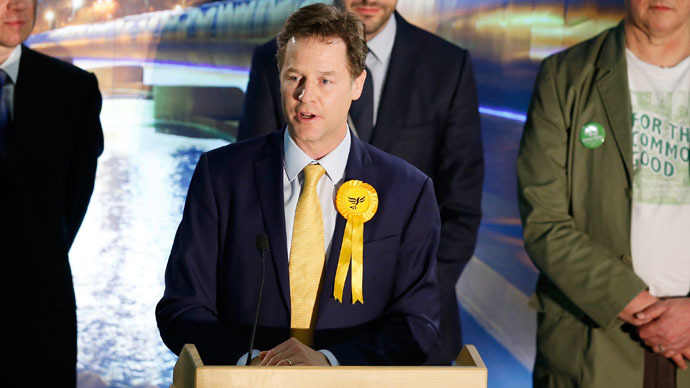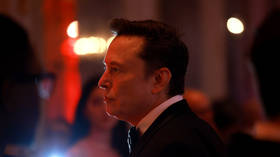Liberal Democrats decimated across Britain in unprecedented defeat

Thursday night provided an extraordinary series of shocks, particularly for the Liberal Democrats, which faced a seismic collapse in voter support across the UK forfeiting some of the party’s most prized seats.
Veteran party members Vince Cable, Simon Hughes and Charles Kennedy all lost their seats, as did the party’s Business Minister Jo Swinson.
Reflecting on the party’s defeat, Lib Dem leader Nick Clegg said Thursday night had proved a “cruel and disappointing” experience for him and his co-members.
In a heartfelt resignation speech, he said “fear and grievance” had won, while Liberalism had lost.
Clegg announced his resignation on Friday before noon, stressing that the election results had been "immeasurably more crushing and unkind" than predicted.
He said he must take responsibility for the Lib Dem's loss, and thanked his colleagues for their hard and diligent work in recent years.
READ MORE: Deputy PM Nick Clegg resigns, as Liberal Democrats decimated in election
As the remaining votes are counted on Friday, the Conservatives are edging closer to an overall majority.
And as the remaining votes are counted, a dramatic collapse in support for the Lib Dems is particularly evident. As it currently stands, it has lost a minimum of 46 seats in Parliament and may have as few as eight seats once the final counts are in.
Compared with the party’s previous 57 seats in parliament, this marks a drop in support of almost 80 percent.
Some of the highest-profile Lib Dems to lose their seats were:
1. Vince Cable
As the tectonic plates of British politics shift, one of the highest-profile Lib Dem members to forfeit his seat was outgoing business secretary and MP for Twickenham Vince Cable. Cable’s exit from the House of Commons proved a heavy blow to the party and for Cable on a personal level, as he had laid claim to the seat since 1997.
The outgoing business secretary was also one of the few Lib Dems who won over 50 percent of the vote in Britain’s last two general elections.
While party leader Nick Clegg described Cable as a “legend of a man” when he visited Cable’s constituency in the final days of the campaign race, Tory candidate Tania Mathias managed to take his seat on Thursday.
2. Norman Baker
Norman Baker, the party’s ex-home office minister, lost his Lewes seat to the Conservatives. In the wake of his defeat, he conceded his political career is over. Baker, an MP in the Commons since 1997, stepped down as a minister in November 2014 following a public row with Home Secretary Theresa May over UK drugs legislation.
3. Danny Alexander
Former Chief Secretary to the Treasury Danny Alexander also lost his seat to the SNP’s 20-year-old Drew Hendry. Analysts suggest Alexander’s loss in support was a direct result of his role in welcoming and implementing the Conservative’s highly controversial austerity program.
Clearly devastated by the news of his defeat, Alexander said he will “always be proud of the difference I and my party have made to the country in the last five years."
4. Lynne Featherstone
Another grueling loss for the Lib Dems is Lynne Featherstone’s defeat in the constituency of Hornsey and Wood Green. A core battleground throughout the campaign race, the seat was a leading target for Labour, which wiped the Lib Dems out there in 2010.
Formerly Home Office minister, then Minister of State for International Development, and back again to the Home Office, she played a core role in campaigning for the 2013 Marriage (Same Sex Couples) Act. She was also one of the leading voices behind government policies to tackle female genital mutilation.
5. Simon Hughes
Another leading Lib Dem to lose his seat was outgoing minister of state Simon Hughes. The former Lib Dem deputy leader lost his seat in Bermondsey and Old Southwark to Labour’s Neil Coyle. Hughes appeared devastated as the news of his defeat broke. Critics suggest he was a victim of the electorate’s distaste for the coalition’s austerity policies and Clegg’s perceived broken promise on university fees.
Hughes secured close to 50 percent of the electorate’s backing in 2010, and has served his local constituency for 30 years.
6. Ed Davey
Lib Dem energy secretary Ed Davey was the first minister to be ousted from the Commons on Thursday night. Davey, who was previously singled out as a potential future party chief, lost his seat to James Berry of the Conservatives.
The outgoing energy secretary held his seat in Kingston and Surbiton since 1997. He took up the position of energy secretary in 2012, following Chris Huhne’s resignation in the wake of allegations he had engineered a miscarriage of justice.
7. Jo Swinson
Jo Swinson won a seat in the Commons at 25 years of age, becoming a Lib Dem MP in Glasgow’s East Dunbartonshire. Following a 10-year stint that saw her move from the position of Nick Clegg’s private secretary to junior equalities minister, Swinson lost her seat to the SNP’s John Nicholson.
8. Charles Kennedy
Former Liberal Democrat leader Charles Kennedy came second to nationalist Ian Blackford in the Ross, Skye and Lochaber. Kennedy said he will remain very much involved in British politics, despite his high-profile defeat by the SNP.
In an impassioned letter to the Liberal Democrats, ex-party leader Paddy Ashdown said the “bitter” election results did not do justice to the party’s “hard work, dedication or passion.”
READ MORE: Ed Miliband resigns as Labour Party leader after general election defeat
“Let us remember what we fought for – liberal values, offering a vibrant, positive, and hopeful alternative for our country,” he said.
“The forces of decency, moderation, unity, respect for others and progressive politics are weaker this morning. But they are not lost, and they must not be lost.”
A Lib Dem spokesperson said the election results appeared to point to an ominous picture.
The Green Party’s Natalie Bennett, who lost her central London seat, said “politics of fear have outweighed the politics of hope.”
Labour’s Ed Miliband expressed grave disappointment at his party’s failure to win a majority in the commons.
“This has clearly been a very disappointing and difficult night,” he said.
“The next government faces a huge responsibility in keeping the country together.”












